Lecture 1 Introduction to writing
Introduction to English WritingPPT教学课件
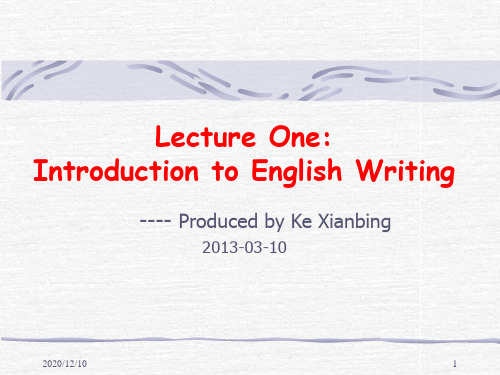
Besides aspects of language which English writing can improve accuracy and clearance of expressing thoughts; Content: logical , correct viewpoint, smooth arrangement; Writing format: strict requirement.
2020/12/10
5
PPT教学课件
谢谢观看
Thank You F0/12/10
2
English writing emphasizes expressing proper thoughts appropriately rather than the seemingly correct sentence structure or diction , the whole textual organization, difficulties, styles, format,
B: to enlarge the extension of English use
i: to enhance learners’logical thinking and analytical ability,
ii: to train a careful and serious working style,
Viewpoint: complex and needing to further discussion
无线通信原理双语lecture1
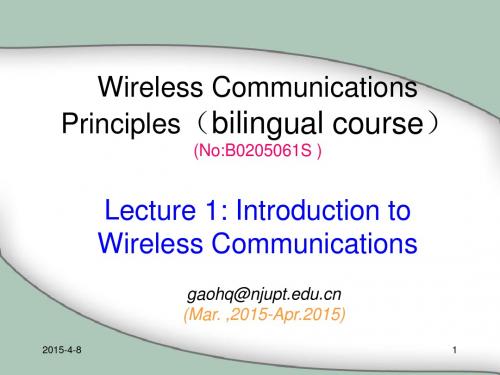
2015-4-8 15
The Cellular Concept The big breakthrough came when AT&T Labs researchers divided wireless communications into a series of cells. High capacity with limited radio spectrum Goal: Increase capacity while minimizing interference
2015-4-8
4
Six Main contents in the course within 32 hours
1)Introduction to Wireless Communications (ch.1,ch.2,selected ch11) 知识点:Frequency Range in Cellular Network, Wireless Communications System Definitions, the Generation of Cellular Networks, Channel Capacity,signal to noise ratio(SNR), receiver sensitivity,Effects of Wireless Channels, Some Features of Wireless Channels, related abbreviation(缩略词).
lecture 2 An Introduction to Writing
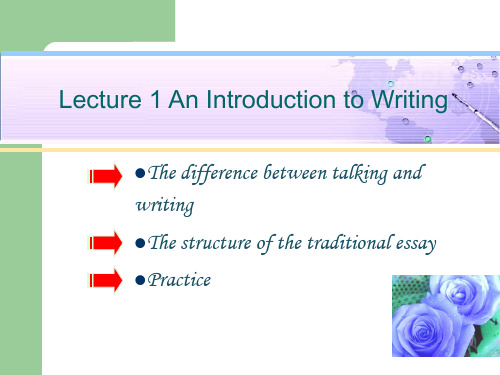
• 2. lack of self-control a) often stuff myself with unhealthy snacks b) might have popcorn, candy, soda, or all three
• 3. other moviegoers a) running kids b) laughing and shouting teenagers c) people of all ages make noise
Differences between writing and talking:
point and support
A model paragraph
Next
Four steps
discover a clearly stated point, or thesis. Provide logical, detailed support for your thesis. Organize and connect your supporting material Revise and edit so that your sentences are effective and error-free.
Body
Three supporting paragraphs Each begins with a topic sentence With specific and detailed evidence in each to back up the topic sentence
Conclusion
Structure of the traditional Essay
• Introductory paragraph • Body: supporting paragraphs • Concluding paragraph
新时代核心英语教程写作1教材

新时代核心英语教程写作1教材Unit 1 Introduction to WritingPart A: Understanding the Writing ProcessIn this unit, we will learn the basics of writing in English. Writing is an important skill that can help us communicate effectively and express our ideas clearly. Whether we are writing for academic, professional, or personal purposes, it is essential to understand the writing process and develop strong writing skills.The writing process consists of several key stages, including prewriting, drafting, revising, editing, and publishing. Prewriting involves generating ideas, organizing thoughts, and planning the structure of the writing. Drafting is the stage in which we put our ideas into written form, while revising involves making changes and improvements to the content. Editing focuses on correcting errors in grammar,punctuation, and spelling. Finally, publishing involves sharing our writing with an audience.Part B: Types of WritingThere are various types of writing, each with its own specific purpose and characteristics. Some common types of writing include:1. Narrative Writing: This type of writing tells a story and often includes characters, setting, and plot. Narrative writing can be found in novels, short stories, and personal essays.2. Descriptive Writing: Descriptive writing uses vivid language to create a picture in the reader's mind. It often appeals to the senses and can be found in poetry, travel writing, and descriptive essays.3. Expository Writing: Expository writing aims to inform, explain, or describe a topic. It is often found in textbooks, news articles, and research papers.4. Persuasive Writing: Persuasive writing attempts to convince the reader to adopt a particular viewpoint or take a specific action. It is often used in advertising, opinion pieces, and argumentative essays.Part C: Writing Skills and StrategiesTo become a proficient writer, it is essential to develop strong writing skills and employ effective writing strategies. Some key skills and strategies for successful writing include:1. Clarity and Precision: Writing should be clear, concise, and to the point. Using precise language andavoiding unnecessary words can help convey our message effectively.2. Organization and Structure: Writing should be well-organized and follow a logical structure. This can help readers follow the flow of our ideas and understand our writing more easily.3. Audience Awareness: It is important to consider the needs and expectations of our audience when writing. Adapting our writing style and tone to suit our audience can make our writing more engaging and persuasive.4. Revision and Proofreading: Revising and proofreading are essential steps in the writing process. It is important to review our writing carefully to correct errors and improve the overall quality of our work.Part D: Practice WritingThroughout this unit, we will have opportunities to practice different types of writing and apply the skills and strategies we have learned. We will engage in activities such as writing short stories, descriptive essays, expositoryarticles, and persuasive arguments. These writing exercises will help us develop our writing abilities and become more confident and proficient writers.In conclusion, writing is a valuable skill that can have a significant impact on our personal, academic, and professional lives. By understanding the writing process, familiarizing ourselves with different types of writing, and honing our writing skills and strategies, we can become more effective and successful writers. Throughout this unit, we will build a strong foundation in writing that will serve us well in future endeavors.。
一个讲座英语作文

一个讲座英语作文Lecture English Writing。
Lecture is an important way to acquire knowledge and improve oneself. Attending a lecture is not only a great opportunity to gain new insights, but also a chance to meet new people and expand one’s network. In this essay, I will discuss the importance of lectures and the benefits they bring.Firstly, lectures are an effective way to learn new things. They provide a platform for experts to share their knowledge and experience with others. By attending a lecture, one can learn about new ideas, theories and concepts in a concise and structured manner. Lectures are also a great way to gain practical insights and learn from real-life examples. For example, a lecture on entrepreneurship can provide valuable advice and guidance for those who want to start their own business.Secondly, lectures offer a great opportunity to meetnew people and expand one’s network. Attending a lecture can help one to connect with like-minded individuals and build relationships with people who share similar interests. This can be particularly beneficial for those who arelooking to make new contacts in their industry or field of study. Moreover, attending a lecture can help one todevelop social skills and improve communication abilities.Thirdly, lectures can be a great source of inspiration and motivation. Listening to a passionate and knowledgeable speaker can be a powerful experience that can inspire oneto pursue their goals and aspirations. A good lecture can also provide a new perspective on a particular topic, which can be a catalyst for personal growth and development.In conclusion, attending lectures is a valuable way to gain new knowledge, meet new people and be inspired. Whether it is for personal or professional reasons,attending lectures can be a rewarding and enriching experience. Therefore, it is important to make time for lectures and take advantage of the opportunities they offer.。
《商务英语写作》课件Lecture 1 Introduction
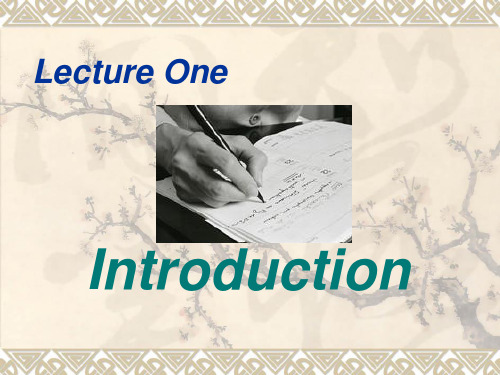
This book will give you an introduction into the most common types of business writing you are likely to meet.
II. The outline of this book
2. Differences (1) Academic writing at college involves essays or assignments for
a teacher who then corrects the work and awards a grade. (2) Business writing is intended to make business transactions or
❖ Writing involve a number of stages :
❖ (1) Clarifying your aim ❖ (2) Identifying your readers ❖ (3) Generating ideas ❖ (4) Organizing the ideas ❖ (5) Sketching a synopsis ❖ (6) Drafting your text ❖ (7) Revising and editing ❖ (8) Proofreading
❖ Part One Introduction
❖ Chapter 1: Introduction of business writing
❖ Part Two Business Correspondence
❖ Chapter 2: The layout of business correspondences
教授讲座的英语作文模板

教授讲座的英语作文模板Title: English Essay Template for Lecturing。
Introduction:Lecturing is an essential part of academic life, and delivering a successful lecture in English requires a structured and well-organized approach. This essay template aims to provide a comprehensive guide for professors and educators to create effective and engaging lectures in English.Opening:To begin with, it is crucial to have a clear understanding of the topic and the audience. The lecture should be tailored to the level of the audience, whether it is undergraduate students, graduate students, or professionals. Understanding the audience's level of knowledge and their interests will help in creating a lecture that is engaging and informative.Main Body:1. Structure of the Lecture。
Start with an attention-grabbing introduction to set the tone for the lecture.Clearly outline the objectives and key points that will be covered in the lecture.Organize the content into logical sections with clear transitions between topics.Use visual aids such as slides, diagrams, and videos to enhance understanding and engagement.2. Language and Clarity。
英语写作第一节课introduction
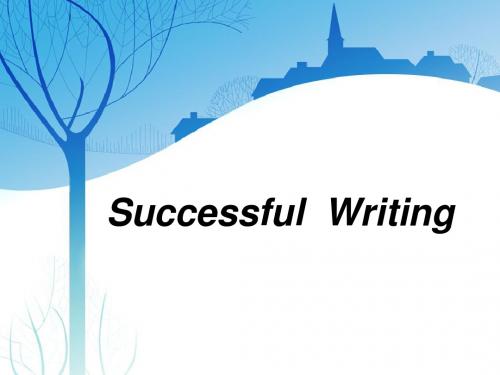
Deciding the title of the essay Purpose: 1) To attract the reader 2) To give the reader an idea of what the essay is about 3) To provide focus for the essay Rules for title: 1) clear, concise and precise
It moves down and up conforming to the Writing task Meanwhile, her double chin is her rhythm. another great feature, which seems to give her voice more power. Above all, you can see what an extraordinary woman she is, so can you guess who she is?
Choose which are subjects and topics? sports, foreign students in U.S Universities, what makes a champion soccer player, education, why I play soccer, my first trip abroad, open classrooms and traditional classrooms, one tour in the USA, world travel, music in elementary school
18
Comparing some terms
―subject‖, ―topic‖ and ―title‖
- 1、下载文档前请自行甄别文档内容的完整性,平台不提供额外的编辑、内容补充、找答案等附加服务。
- 2、"仅部分预览"的文档,不可在线预览部分如存在完整性等问题,可反馈申请退款(可完整预览的文档不适用该条件!)。
- 3、如文档侵犯您的权益,请联系客服反馈,我们会尽快为您处理(人工客服工作时间:9:00-18:30)。
Manuscript Form
• • • • • How to Write the Title of a Composition Capitalization Word Division Punctuation Correction symbols
How to Write the Title of a Composiห้องสมุดไป่ตู้ion
• 5) Your teacher will not correct your compositions word by word, but judge them as a whole. • 6) You can know how to write good articles not through your teacher’s correcting the grammar mistakes in your exercises, but through your daily practice. • 7) Writing cannot be simplified to a set of rules or guideline, and people can never learn to write once and for all, because works change according to the people, purposes, and places involved.
2. Your final grade/marks depend on
• 1) Class attendance and classroom performance & your accomplishment of the assignments accounts for 30%; • 2) Final exam accounts for 70%
Guiding Ideas on English writing
• 1) The ideas of your articles can only come from your daily accumulation of extensive reading and your thinking; • 2) Good articles come from your arduous practice; • 3) Your teacher’s role is to stimulate your interests in writing; • 4).Your teacher’s task is to teach you some techniques on writing and design suitable writing tasks for you to practice;
English Writing
Instructor: Wang Taohua
Lecture 1: Introduction to English Writing
Outline
• About the Course • Manuscript Form
About the Course
• • • • 1. Some Requirements on This Course 2. Final Examination 3. Guiding Ideas on English writing 4. Writing test forms & requirements in TEM-4 • 5. Classroom activities • 6. Outside drills and examinations
•
• The writing style may be argumentative, expositive, narrative, and descriptive. In most cases, the former two styles are tested in TEM-4, esp., argumentative. The topic of a composition tested in TEM-4 is usually about college students’ life, study, and heated social problems, etc. which students are familiar with.(The Best Way to Stay Healthy <2002>; To Save Money or Not <2006>; My View on University Art Festival <2005>)
✿Writing test forms & requirements in TEM-4
• • • • Two sections of writing tested in TEM-4: Section A (Composition) (15 marks) & Section B (Note-writing) (10 marks) Section A: Composition (200 words in 35 minutes ) You’re required to write a composition of about 200 words on a certain topic implied in the given context. Generally speaking, marks will be awarded for content, organization, grammar, and appropriacy. Namely, writing a composition of about 200 words according to the given title/outline/instructions/figure statistics, etc., right grammar, accurate words, fluent expressions, relevant content, rigid organization, and proper style are required.
E) Outside drills and examinations
• 1. Written exercises (printed out, handed in, corrected by tutors) • 2. Network exercises (submitted in and checked via Homework Corner on net) • 3. Mid-term and final exams (taken in given time and graded by tutors
1. Some Requirements on This Course
• 1) Attend every writing lesson; • 2) Devote your efforts to meet the requirements of this course; • 3) Be active in class (Volunteers are always welcome & will be given more); • 4) Finish assignments in time; • 5) Prepare two exercise books, one for in-class exercises; the other for afterclass exercises;
Practice
Think out 3-4 titles of compositions
Can Money Buy Happiness? My First Visit to the Summer Palace A Major Advantage of Advertising on Television On College Students Taking Part-Time Jobs My Idea of Becoming a Teacher in the Future My Idea on Private Cars
• 4) No period is used at the end of a title; • (Use a question mark if the title is a direct question, but do not use one if it is an indirect question); • 5) Use quotation marks with quotes or titles of articles; • 6) Underline/ italicize names of books. • ❁Note: You can capitalize each letter of the words in the title (full capitalization), or you can capitalize the initial letter of key words in the title.
•
Classroom activities
• Text presentation (writing type, writing background, theme of the text, structure of the text) • Text appreciation (wordings, writing techniques, rhetorical devices, etc.) • Exercises (word study, paraphrasing, passage-writing, etc.)
• 1. General Principles of Writing the Title • 1) Write the title in the middle of the first line of a page; • 2) Capitalize the key words in the title (including words following hyphens in compound words); • 3) Not capitalize articles (a, an, the), coordinating conjunctions (and, or, but, nor, for, ), short prepositions(in, on, at, to, for..), nor the to in infinitives; but if one of them is at the beginning of a title, it should be capitalized;
